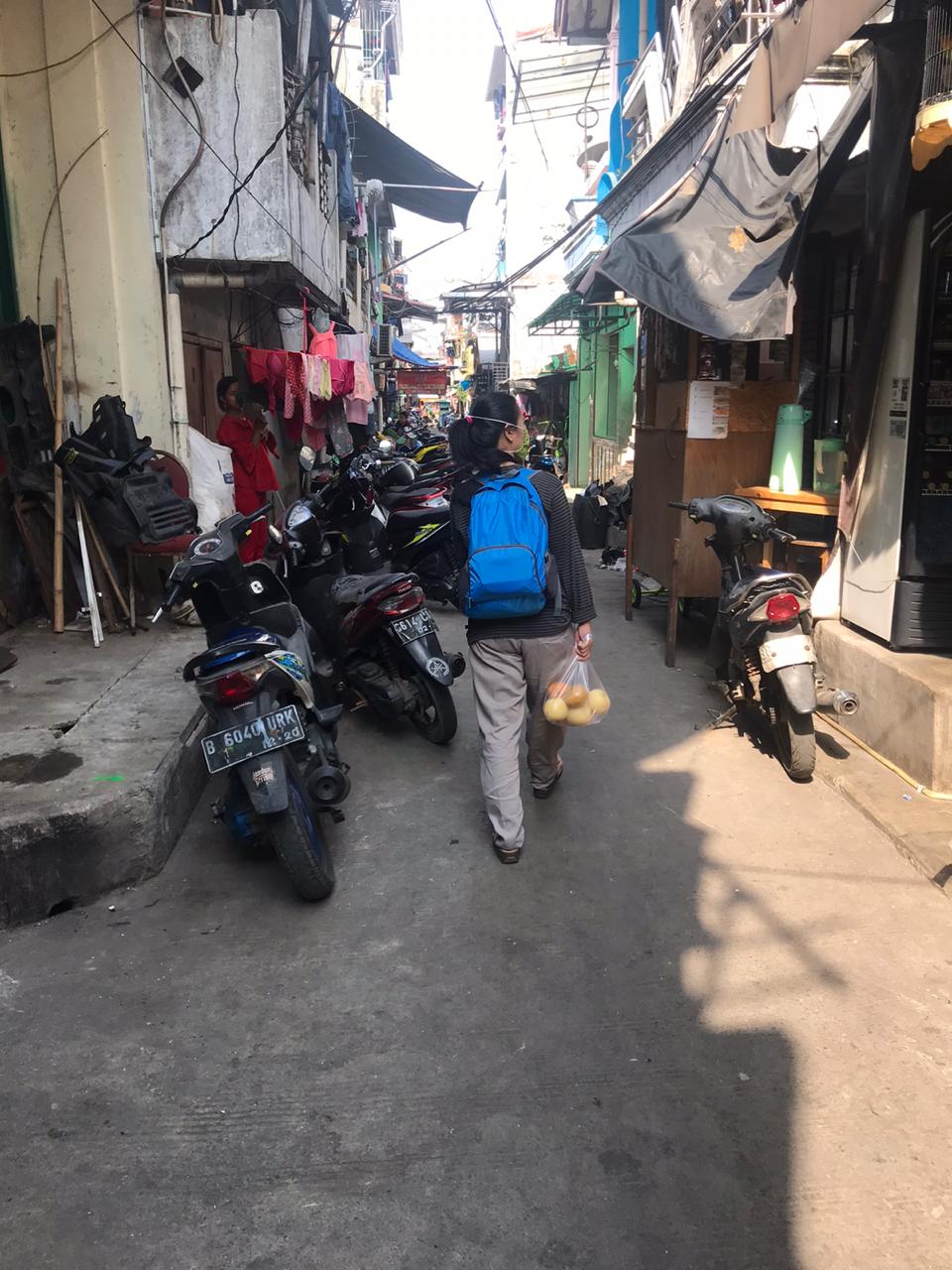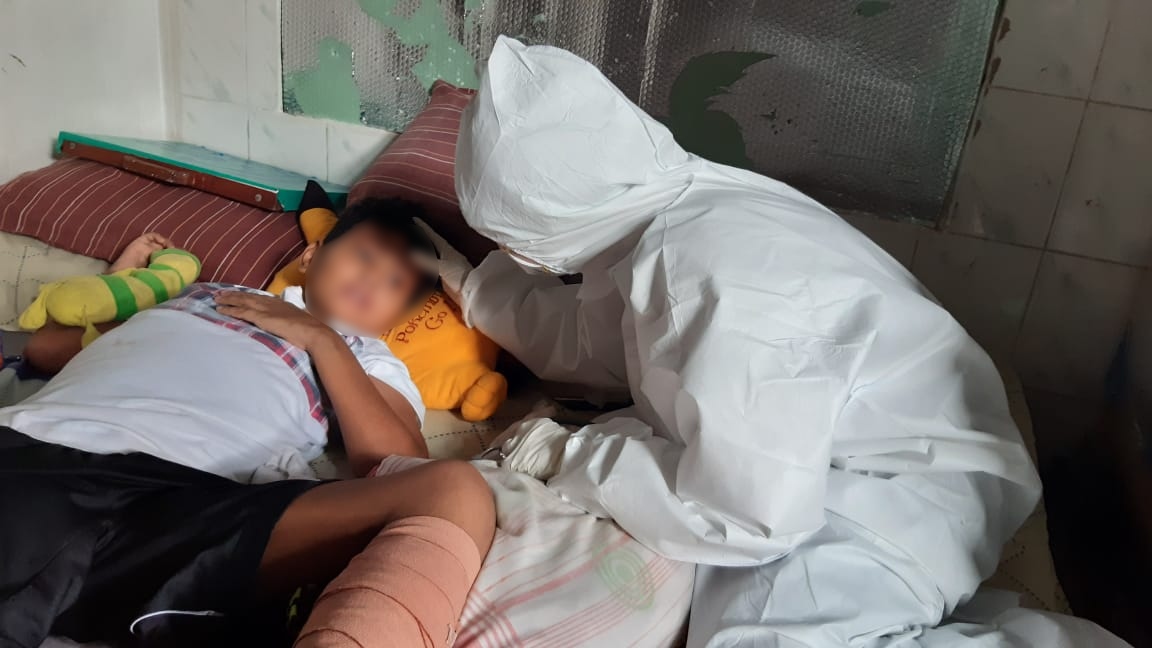 In the middle of the hot sunny day, nurse Ribka walked hurriedly along a small alley in one of the most densely populated areas in Jakarta. Her medical bag slung over her shoulder packed with the tools she needs for her patient today, while on her hand is a bag filled with milk powder and other daily necessities for the same patient.
In the middle of the hot sunny day, nurse Ribka walked hurriedly along a small alley in one of the most densely populated areas in Jakarta. Her medical bag slung over her shoulder packed with the tools she needs for her patient today, while on her hand is a bag filled with milk powder and other daily necessities for the same patient.
As she is walking, Ribka shares her worries about the patient she is visiting today. She hopes El* is in a good mood and willing for her to examine him. El is a 9-year old boy who has endured great trials at a tender age. He was diagnosed with leukemia in 2017, when he was just 7. A boy who used to be cheerful and full of smiles has been transformed by the illness to be an emotional, easy-to-anger and closed-up boy. This is particularly challenging when interacting with members of the medical team.
The first time Ribka visited El, she was faced with a shocking bout of anger from El as soon as she entered the house. Eventually, Ribka had to leave to allow El’s mom to calm him down. It was not until Ribka was almost arriving back at the office that she received a call from El’s mom to let her know that it was safe for her to return.
El’s emotional outburst caught Ribka completely by surprise. The experience led Ribka to delve deeper into his past, to try to understand what he had been through. What she uncovered made her realize the immense suffering El had gone through that caused this deep suspicion and distrust towards the medical team. When El first learned about his illness, he was too young to understand what would happen in the future. The people around him kept telling him that with the doctor’s help and the battery of tests and sleuth of treatment, El would recover and that all will be well again. This is what El believed during his many years of treatment.
But the reality is far from that picture painted for him by the adults. Years have gone by, El is still sick and his condition continues to deteriorate. By the time he was referred to Rachel House, his prognosis was not good at all. He had a large festering wound on his left leg that caused intense pain whenever he tried to move the leg. The pain had so traumatized him that he would scream and shout when anyone made an attempt to get near it. This also meant that he was unable to stand nor walk, too terrified by the pain. For a boy who used to play football with his friends in the neighbourhood, this was the last straw.
As Ribka learned about El’s journey, her heart went out to this little boy who is lashing out from pain and disappointment that he could not express. “In palliative care, we learn about total pain – the pain that is experienced not only from the physical aspect, but also from the emotional, psychosocial, and spiritual aspects. El is experiencing all of this at such a tender age. His only way to express his pain is through this outburst” said Ribka.
Understanding El’s plight better, Ribka knew that in spite of all the challenges ahead, she would not allow herself to be discouraged. On subsequent visits, armed with the knowledge of El’s favourite food and activities, she would pack her bag with food, and crayons and coloring books for him. Ribka found out from El’s mother that besides football, his biggest love is to draw; El had even won a drawing competition.

As time went by, the ice of distrust slowly melts. Although sometimes El still gives her the cold shoulder, he has started to look at Ribka and keep the eye contact with her. On a good day, he would even respond to her questions with a nod or a short answer. After the third visit, a wonderful breakthrough – he finally allowed Ribka to clean the wound on his leg and change the dressing for him! This is a very big step for their relationship, according to Ribka.
The journey with El has taught Ribka many valuable lessons. It has highlighted how the pandemic, with the need for masks and protective garments, has created a physical barrier between her and her patients. Previously, she would enter the home of her patients as part of the family, dressed in her normal attire. Now, in her protective garments, she is immediately identified by the children as a medical professional, there to cause them pain and distress.
However, with the pandemic limiting patients’ ability to access care in the hospitals, Ribka knows that her presence is needed even more now; playing her role as the patient advocate to ensure her patients get the medication and opioid they need, and as the educator to help patients’ parents administer the care the children need at home – just as she helped provide guidance to El’s mother in the cleaning and the dressing of the wound on his leg.
After two months of loving care and attention from Ribka, the wound on El’s leg is healing well, allowing El the confidence to straighten his leg. He is even attempting to stand up now.
“Thank you for not giving up on our son, and for trying to look through his anger,” El’s mother said with a sigh of relief and gratitude. “Your presence has been such a blessing for our family. Not only do we now have someone to call when El needs help, but you have also provided our family with a pillar to lean on – especially when we are at a loss on how we can support ourselves financially with all these expenses.” El’s mother added, referring to the financial difficulty the pandemic has brought upon the family after depleting all their resources to find cure for El.
For Ribka, El has taught her an invaluable lesson – that in order to provide the best care for her patients, she must first try to understand them as a whole person, with their total pain. Seeing El, not just for the physical symptoms, but also his emotional pain from trauma, disappointment and the loss of his childhood. “I may not be able to heal El’s trauma, but I can promise to be his friend and accompany him and his family through these challenging roads ahead.” Ribka said with a quiet smile.
*name changed for privacy
If you would like to help give sparks of joy to the children we care for at Rachel House, please donate to support our work.